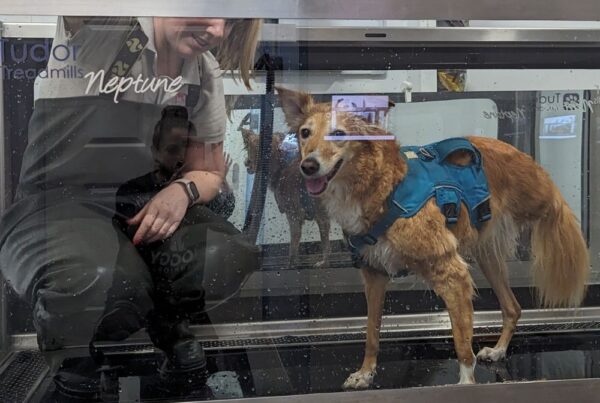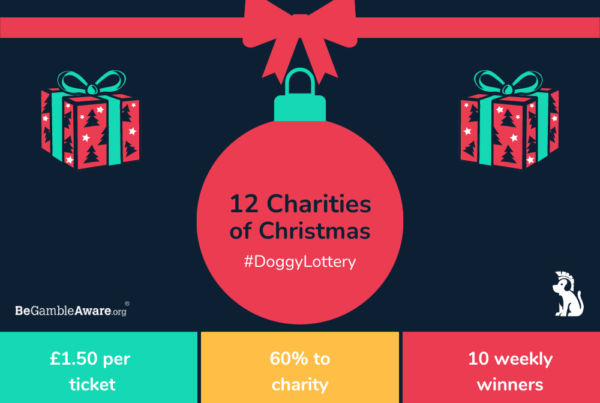
Dogs are man’s best friend; they provide endless loyalty, companionship and unconditional love. But have you considered if you’re really ready for a dog?
Caring for a dog is no walk in the park. Did you know that the top three reasons for dog abandonment in the UK are:
- Unwanted behaviour
- Not having enough time to care for a dog
- Not being able to afford dog care, including vet bills
All of these issues are largely avoidable, and that’s why it breaks our hearts that so many dogs are still being abandoned. You should never get a dog on a whim. Bringing a four-legged friend into your life is something that requires a lot of research and self-reflection.
But how do you answer the all-important question: ‘should I get a dog?’.
These six essential questions are what you need to ask yourself to find out if you’re ready for a dog. If you answer all of them with a firm ‘YES!’, you’re well on your way to becoming a well-informed and dedicated dog owner.
1. Do you have enough time for a dog?
Training, companionship and exercise. These are the main three things you’ll need to make time for once a pup enters your life.
First of all, have a think about what your typical day looks like. How much time do you spend at home when you’re not at the office, seeing friends or doing hobbies? Dogs shouldn’t be left alone for more than four hours a day, and that’s less than the time most people spend at work! Pups become lonely and distressed with nobody around. Those that lack social interactions and mental and physical stimulation are more likely to exhibit unwanted behaviours.
If you’re working at home right now and thinking about getting a dog, ask yourself this: can you still work whilst being disturbed by a needy pup? In between Zoom calls and deadlines, do you have time to walk your pooch and play with them?
All dogs need daily exercise to keep healthy and help satisfy their natural curiosity. The amount of exercise a dog needs depends on their breed and size. Dog walks are a wonderful opportunity to get out and about and build a special bond with your pup, but they won’t take too kindly to ‘sorry Buddy, not today – I’m too busy!’.
Next, think about training. Training a dog is crucial for both of you, as it sets you up nicely for a wonderful relationship built on respect and understanding. The key to seeing great results is consistency and knowledge.
‘The right dog training doesn’t need to take long each day, but it does need some knowledge (or the desire to learn) and consistency,’ says Niki French, pro dog trainer. ‘Whether you’re getting a puppy or taking on an older dog, you are going to need to spend time training them. This is a fun part of having a dog! But go into this with open eyes. Some days with our dogs can be testing! It’s not all snuggles on the sofa and sunny walks.’
2. Can you offer a dog a suitable environment?
All dogs need space to walk around freely, play with their favourite toys and dispel some energy if they need to – yes, we’re talking about the famous “zoomies” when a dog suddenly starts zooming around like crazy. Is your home large enough for a dog? Do you have any outside space where they can run around and have a good sniff?
The amount of space a dog needs depends on their breed and temperament – it goes without saying that a larger pup will need more space than a small one – but no matter the dog’s size, you need to ensure they have a warm and cosy spot to rest and a safe hiding place if they want some time alone. They also need to have somewhere to go to the toilet, so bear this in mind if you live in a flat without a garden.
3. Have you done your research?
The Kennel Club conducted a study which showed that as many as 40% of dog owners chose their new furry friend based on how they looked. In an ideal world, 100% of would-be dog owners would be choosing their new dog based on research and facts.
‘Should I get a dog?’ is the first of two major questions any potential dog owner should ask, with the second being ‘which dog is the best fit for me?’. You should never choose a dog based on their “cute factor” or to fit in with a trend.
The remedy to this is self-reflection and a whole lot of research. If a dog doesn’t fit your lifestyle, personality and home environment, the chances are that you’ll both be unhappy.
Niki says: ‘the number one question I ask would-be dog owners is this: what are your energy levels as a family? Be honest now! What do you like doing? Are you the kind of person or family that loves a bracing daily walk for a couple of hours, no matter what the weather? Or do you like to curl up on the sofa binging on the latest Netflix series? Whatever your answer is, it needs to match up with the kind of dog you’re looking for.’
If you want to avoid the devastating situation where you feel you have no choice but to abandon your pup to a dog rescue centre, make sure that you research different breeds. You need to be able to care for a dog according to their specific needs – you can’t expect the dog themselves to adapt to your lifestyle.
Here at DoggyLottery, we’re passionate advocators of ‘adopt don’t shop’, and one of the many reasons for this (aside from wanting every needy pup to find a loving forever home) is that staff at dog rescue centres are not interested in making a sale; they are dedicated to finding each abandoned dog a new home and owner who is right for them. They will ask the right questions and take the time to match you to the ideal dog, taking into account their breed and temperament.
The simple truth is that you’re only ready for a dog if you’re willing to value their needs over their “cute factor”. Do your research and reach out to the staff at your local dog rescue centre for help and advice.
4. Can you afford a dog?
Many people underestimate the costs involved with having a pet pooch to look after, and an inability to afford a dog’s upkeep is amongst the most cited reasons for dog abandonment.
Aside from some of the more obvious expenses, you may be surprised at all the unexpected costs that can mount up!
- Weekly food: Please buy the best quality you can afford for your pup’s long-term health. Remember, our canine companions need special dog food to keep them in tip-top condition – you can’t feed them whatever you’ve got lying around the house.
- Equipment: You’ll need to buy equipment, like beds, bowls, toys, leads, harnesses, crates and car restraints.
- Training: Niki says: ‘Invest in some great, positive rewards-based training to set you and your dog up for the most incredible relationship.’
- Grooming: Some dog breeds need regular grooming to keep their coats and claws in optimum condition. Without proper grooming, they can develop harmful skin and health conditions.
- Care and support: What will happen if you want to go away and can’t take your dog with you? Can you afford to put your dog in kennels? What about doggy day care or a dog walker for when you can’t be there?
Now let’s talk about veterinary costs.
‘People do underestimate the cost involved,’ says Ben Wilkes at Border Collie Trust. ‘We’ve noticed over the years more people finding themselves with an ill dog and the prospect of a very expensive bill or some difficult decisions to consider. Like human medicine, veterinary medicine has advanced tremendously, and so conditions that were once almost untreatable are now possibly curable or can be managed – but at a cost. Pet Insurance doesn’t come cheap and there are so many things to consider when you take out a policy that may not come to light until you wish to make a claim.’
Niki adds: ‘Remember, the price of most pet insurance policies goes up quite significantly as a dog gets older because their medical needs are likely to increase.’
Can you afford vet bills or pet insurance for the next 15-20 years? Can you factor the weekly and monthly costs of dog food, grooming, equipment and care into your budget?
5. Is everyone in your household on board?
This might sound like an obvious question and you’re probably sure of the answer, particularly if you and other members of your household – friends, a partner or kids – have been eagerly discussing a new four-legged housemate for some time. But is everyone on board with the realities and responsibilities that come with owning a dog?
Niki says: ‘For obvious reasons, we’re drawn to the cute puppies. But after the first few loved-up fun-filled weeks, you are now lacking in sleep, tired of cleaning up poop and pee and the cute puppy is painfully biting your ankles, hands and anything else it can get his or her mouth on! The novelty can quickly wear off.’ Is everyone in your household prepared for months of puppy antics? Will others take responsibility for walks, playtime, supper time, cleaning up accidents and dealing with any potential puppy damage? If not, a lot of pressure will fall on your shoulders.
Even if you decide to adopt an older, trained dog, training is a commitment for life and is everyone’s responsibility. Training can be great fun when you get other people involved, especially kids. There are all kinds of opportunities for games, puzzles and even teaching tricks! But if not everyone is on the same page, unwanted behaviour could soon develop.
And what about the smaller members of your household – have you thought about how a new pup could affect them? Not all dogs, cats or other furry creatures react well to new pups being introduced into the house; in some it causes anxiety and discomfort. Think carefully and if necessary, speak to a vet or a dog trainer for advice.
6. Can you make the commitment?
So you’ve answered ‘yes!’ to the five questions above and you think you’d make a fabulous dog mum or dad – but can you honestly say that you’ll stay committed to your canine companion for the rest of their life?
The amount your dog costs will change over the years. Ben says: ‘I think most folks think of the immediate initial cost, but they don’t really think of the potential costs over the next X number of years.’ Will you always be able to afford to care for your dog and offer the healthcare they need, even if those costs rise?
Training is also something you will need to commit to over the years. ‘Training our dogs isn’t something to tick off a list and you’re done,’ says Niki. ‘I love the phrase, “no progression is regression”. Training is an ongoing part of having a dog.’
If you think your lifestyle or circumstances will dramatically change in the coming years, consider how this will impact your pup. Perhaps you’re working at home right now, but you’ll soon be heading back into the office. Maybe you fancy moving abroad in the future. You could be planning to start a family, or you might be heading into retirement.
Dogs form really strong bonds with us, so any family or lifestyle changes are likely to cause them stress. But the truth is that nothing causes a dog more heartache than being abandoned to a dog rescue centre by their beloved owner. If there is anything that could affect your ability to care for your pup in the next 15-20 years, or however long your four-legged pal lives, you should ask yourself if you are ready for a dog at all.
Think you’re ready for a dog? Getting Dog Care Right: Your Responsibilities As An Owner
Thousands of dogs are abandoned each year across the UK, and dog rescue centres are doing their utmost to care for, rehabilitate and rehome needy pups.
But dog rescue centres need your help!
Support rescue dogs by joining our fun game, DoggyLottery, and play to win fantastic cash prizes each week! At just £1.50 per ticket, our charity lottery is an amazing way to support dog rescue centres and help them continue their vital work.
Keep learning – How To Avoid Returning Your Dog To A Rescue Centre
A huge thank you to dog trainer Niki French, founder of PupTalk, and Ben Wilkes at the Border Collie Trust for their incredible insight and help with this article.
About Niki French
Niki French is a dog-mad people-loving dog trainer. She is on a mission to help people leave stress and frustration behind, with simple, fun and transformational training. Because having a dog doesn’t need to be hard work.
www.facebook.com/groups/puptalk/
Instagram/Twitter/TikTok: @puptalk101
About Border Collie Trust
Border Collie Trust G.B. Situated at Colton, Nr Rugeley rescuing and re-homing Border Collies throughout the UK. Prior to re-homing all dogs are wormed, vaccinated and micro-chipped and leave us with a lot of advice and information and the promise to take our dogs back at any time.
Website: Border Collie Trust GB
Facebook: @bordercollietrustgb



